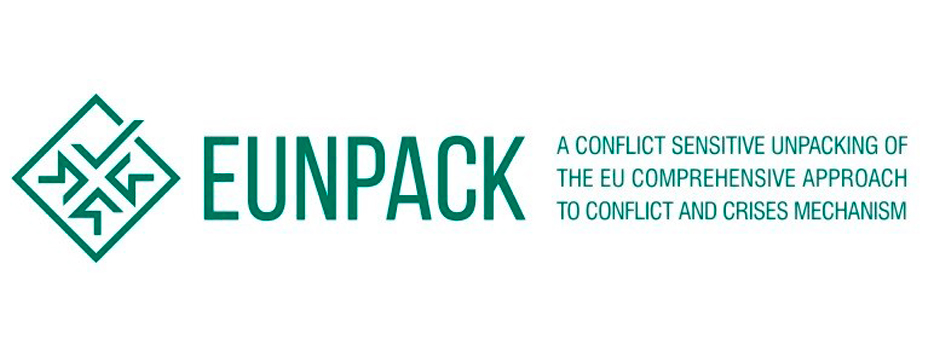Project Description
| Full Title: | Good intentions, mixed results – A conflict sensitive unpacking of the EU comprehensive approach to conflict and crisis mechanisms |
| Project in Brief: | EUNAPACK is an EU funded (under Horizon 2020) multi-disciplinary research project, carried out by a consortium of 12 highly experienced partner institutes: Norwegian Institute of Foreign Affairs (NUPI), National Center for Scientific Research (CNRS), Freie University Berlin (FUB), Comenius University in Bratislava, the University of Manchester, the Alliance for Building Governance in Africa (ARGA), National University of “Kyiv-Mohyla Academy”, Kosovar Centre for Security Studies (KCSS), Centre for European Policy Studies (CEPS), Middle East Research Institute (MERI), Belgrade Centre for Security Policy (BCSP), San’t Anna School of Advanced Studies.
Website: EUNPACK.eu |
| Term: | September, 2016 - March, 2019 |
| Most Recent: | Publications and Events |
Context
EUNPACK has been designed and developed to critically examine whether the EU external crisis response is sensitive to the political and social context on the ground. In order to achieve this, the project takes a holistic approach that covers the whole crisis cycle, the full EU toolbox, and the EU’s ability to respond to crises in different types of regions (e.g. Enlargement Area, ENP Area and Extended Neighbourhood). This allows us to provide analyses of the EU’s comprehensive approach – the method of choice in external action – and how it is implemented in the field; to undertake a comparative analysis of the Union’s approach to crisis in different regional contexts; and thereby to identify lessons learnt in order to suggest how EU crisis management institutions and policies can be improved.
The EU is one of the world’s most frequently studied international institutions. However, what is lacking is systematic, in-depth analysis of the EU crisis response mechanisms in specific target countries and how these mechanisms are received and perceived on the ground, not just by governments and elites, but also by different groups of people. This is important as the EU’s activities resonate differently with different groups of the population. The main objective of EUNPACK is therefore to unpack EU crisis response mechanisms in order to provide new insights that can increase our understanding of how crisis response functions and is received on the ground in target countries, and how it can be improved. By introducing a bottom-up perspective combined with an institutional approach, we will be able to explore local institutions and perceptions in target countries without losing sight of the EU’s institutions and their expectations and ambitions. This allows EUNPACK to analyse the full cycle of dynamic events, from EU intentions, motivations and subsequent implementation, to local actors’ perceptions and reactions, and back again to EU intentions and understanding. This will be achieved through the employment of a mixed-methods approach that combines desk research and fieldwork, including surveys, perception studies and in-depth interviews. In line with a grounded approach to research, EUNPACK will collect primary empirical data with a focus on practices rather than mandates, focusing on how the EU is seen as an operating actor in crisis response by target states and audiences. The case studies in EUNPACK are selected on the basis of a range of challenges that the EU addresses (different types of crisis and different levels of crises) and the variation in policy frameworks and instruments employed to respond to these challenges. Our project will therefore study the EU’s crisis response mechanisms in the policy realms of enlargement (Kosovo and Serbia), neighbourhood (Ukraine and Libya) and the extended neighbourhood (Mali, Afghanistan and Iraq).
MERI’s Participation
The Middle East Research Institute (MERI) in collaboration with universities (Freie University, Manchester University) and research centres (NUPI) focuses on providing a bottom-up analysis of how EU crisis response is received and perceived by different local actors in Iraq and Iraqi Kurdistan throughout the conflict cycle. In particular, it will identify reception of EU policies in the humanitarian sector at the state level and whether the EU response is corresponding to the needs of the target state (local ownership). At the same time, the study will address which non-elite groups are being targeted and how different groups perceive EU responses. Some of the questions that will be addressed are the following: are EU responses perceived as conflict-sensitive and as addressing the needs of vulnerable groups? Is there a difference between reception/perception of the EU and member states? How do EU responses measure up to responses of other international actors? While the methodology will reflect the developing situation on the ground, it will ideally entail interviews with state/local elites, direct observation of EU practices, focus group discussions with various groups (with a stress on vulnerable populations), and perception studies.
ankara escort
çankaya escort
ankara escort
çankaya escort
escort ankara
çankaya escort
escort bayan çankaya
istanbul rus escort
eryaman escort
escort bayan ankara
ankara escort
kızılay escort
istanbul escort
ankara escort
ankara rus escort
escort çankaya
ankara escort bayan
istanbul rus Escort
atasehir Escort
beylikduzu Escort

This project has received funding from the European Union’s Horizon 2020 Research and Innovation Programme under Grant Agreement No 693337.
For more information please contact us at info[AT]meri-k.org


